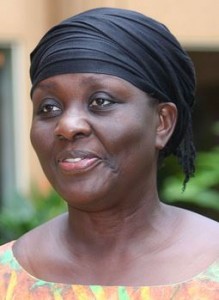 At a breakfast meeting during the recent Hunger Project Fall Event, Dr. Speciosa Wandira-Kazibwe, member of the Board of Directors, made the comment that “if you don’t do anything, you will think that nothing can be done.”
At a breakfast meeting during the recent Hunger Project Fall Event, Dr. Speciosa Wandira-Kazibwe, member of the Board of Directors, made the comment that “if you don’t do anything, you will think that nothing can be done.”
Dr. Wandira-Kazibwe of Uganda is no novice to getting things done through others. She is U.N. Special Envoy to the Secretary General for HIV/AIDS in Africa. She is also Senior Adviser to the President of Uganda on Population and Health and coordinating the development of reforms for Uganda’s health system. From 1994 to 2003, she served as Vice-President of Uganda, the first woman in Africa to hold such a position.
Now, you can slide by her statement and hardly notice it, or you can be rocked to your core by the profound nature of it. I prefer the rocked to the core end of the spectrum. It is a statement that has acupuncture accuracy about how many people approach the world. Think about it for a moment. How many people do you know that see some area of life as hopeless? How about you? Where are you in complaint, inaction, and experiencing a sense of hopelessness? When you examine yours or another’s sense of hopelessness, how often do you see that no action has been, or is being, taken?
The military has a process referred to as the “OODA Loop.” The steps are, “observe, orient, decide, and act.” Repeat the process. It does not say observe, orient, decide, and give up. It also does not say that if you observe, orient, decide and act that everything will turn out for you. It says do the loop again and again.
So, as you look at your industry, your business, your team and organization, are you willing to challenge the “nothing can be done” beliefs? Both your own and those within your team? If the answer is “yes” read on.
To get in the swing of this approach, pick a somewhat bold accomplishment, and set aside yours or your team’s sense of “nothing can be done.” Start with the end in mind, and brainstorm some action steps that are “close in,” (as poet David Whyte would say), meaning that they can be accomplished right away and start moving things in the right direction. Begin with the first step in the direction you want to go. Proceed one step at a time. Stay with it. Turn Dr. Wandira-Kazibwe’s observation into “if you do something, you begin to see that something can be done!”
